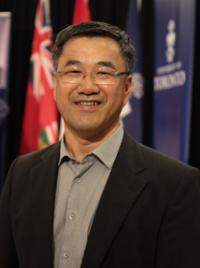
Heart disease is a major cause of disability and death in Canada. Dr. Li’s research program focuses on improving cardiovascular medicine by advancing new insights discovered from basic scientific research to clinical applications for heart repair and regeneration after myocardial infarction. These strategies include cell therapy and tissue engineering.
Cell therapy: In 1996, Dr. Li’s research team demonstrated that cells transplanted into myocardial scar tissue improved heart function. Over the last 25 years, they have defined molecular and clinical models of muscle cell transplantation for Repair, followed by stem cell transplantation for Regeneration. Both technologies have been translated to clinical applications. As most patients with heart failure are older adults, Dr. Li's team is currently elucidating the mechanisms by which transplanted cells exert their beneficial effects by Rejuvenation of aged stem cells and aged recipients. Clarifying these mechanisms of Repair, Regeneration and Rejuvenation (3Rs) will help develop the “next generation” of cell therapy for patients with cardiovascular disease.
Tissue engineering: Cardiac scar tissue creates a barrier between heart cells, leading to an irregular heartbeat. Biomaterials may be used to bridge the conductive signals across the scar area. Dr. Li's team created a new Conductive Biomaterial which can synchronize cardiomyocyte contraction in heart disease models, and is now investigating translational applications.




 https://orcid.org/0000-0002-2584-060X
https://orcid.org/0000-0002-2584-060X